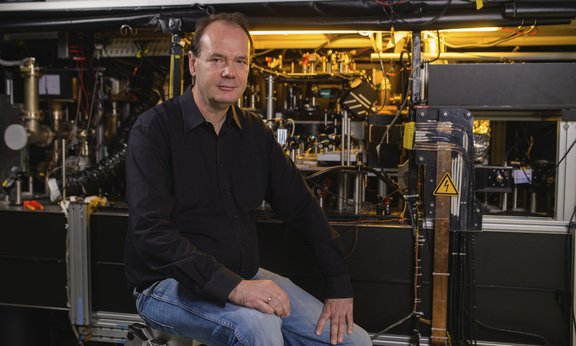ERC Advanced Grants are the highest scientific awards of the European Union. It supports outstanding researchers across Europe. The European Research Council (ERC) provides these bright minds with funding from the EU's Framework Program for Research and Innovation to pursue their ideas and play a crucial role in advancing various fields of knowledge. Rudolf Grimm of the Department of Experimental Physics at the University of Innsbruck and the Institute of Quantum Optics and Quantum Information at the Austrian Academy of Sciences will receive a total of around 2.5 million euros for his SuperCoolMix project to study novel states of matter such as superfluidity and superconductivity in ultracold quantum gases.
Ultracold mixture
The intricate mechanisms leading to superfluidity and superconductivity have fascinated researchers for many decades. To better understand such phenomena, the research group led by Rudolf Grimm is now using a new experimental approach that they have only recently been able to establish in the laboratory: a stable, strongly interacting fermion mixture of elements with different masses. Fermi gases consisting of different elements have indeed been produced for several years. However, the difference in mass is the key to novel states of matter, but such systems have not been stable enough until now. Grimm's team uses a mixture of dysprosium and potassium that has the key ingredients needed to create novel strongly interacting superfluids: Mass imbalance, tunability of interactions and collisional stability. "Our system currently represents the only experimentally available Fermi-Fermi mixture that offers this combination of properties," Grimm says. "In the next few years, we will realize strongly interacting Fermi-Fermi superfluids and investigate the various regimes of superfluidity, with the ultimate prospect of demonstrating symmetry-broken phases." To this end, the researchers will also extend their studies to a new extreme mass ratio system of lithium and dysprosium.
On Rudolf Grimm
Rudolf Grimm was born in Mannheim, Germany, and studied physics at the University of Hannover. After working at the ETH Zurich, at the Institute for Spectroscopy of the USSR Academy of Sciences in Troitsk near Moscow and at the Max Planck Institute for Nuclear Physics in Heidelberg, Rudolf Grimm was appointed to succeed Anton Zeilinger at the University of Innsbruck in 2000. Here he and his team were able to prepare a Bose-Einstein condensate of cesium atoms as well as a Bose-Einstein condensate of molecules and a Fermi condensate for the first time. In the following years, Grimm realized multiple physical phenomena in ultracold quantum gases, such as the Efimov states modeled by the Russian theorist Vitali Efimov more than three decades earlier.
For his achievements, Rudolf Grimm has already received many awards. In 2005, for example, he was awarded the Wittgenstein Prize, the country's highest scientific honor, and in 2008 he received the Tyrolean State Prize for Science. In 2009, Grimm was named Scientist of the Year. In 2018, he received the Faddeev Medal together with Vitali Efimov.

